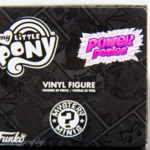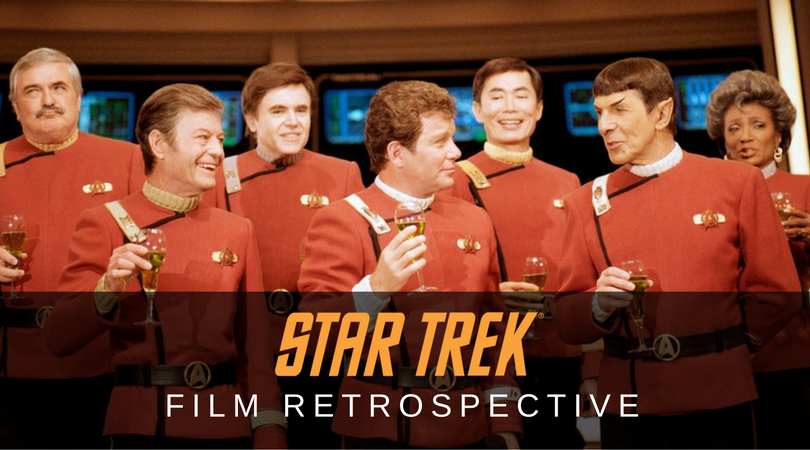
2016 has been a year of ups and downs, but for me it was a year of personal growth through embracing myself as a Trekkie. As noted in my Trekking at 30 article, 2016 was the year I discovered Star Trek through the passion of my wife, and on December 31, 2016, we closed out the year by watching the only Star Trek movie I hadn’t seen: Star Trek: Nemesis. Now I still have about a season left of The Next Generation, and the entirety of Deep Space 9, Voyager and Enterprise ahead of me, but at this point I am no longer a reluctant bystander, I am fully invested in this universe. This is my film by film breakdown of the Star Trek series.
Star Trek: The Motion Picture
 As a science nerd, the end of the movie got me incredibly excited for the future of space travel and how humanity will tackle all of the challenges space brings. But getting to that ending was absolutely atrocious. The movie starts with what can only be described as the modeling supervisor’s wet dream. There is about a half hour of footage of various pans of the Enterprise, which I kind of understand, as Star Trek The Original Series went off the air in 1969, and this movie came out in 1979, so they want to dial into that nostalgia.
As a science nerd, the end of the movie got me incredibly excited for the future of space travel and how humanity will tackle all of the challenges space brings. But getting to that ending was absolutely atrocious. The movie starts with what can only be described as the modeling supervisor’s wet dream. There is about a half hour of footage of various pans of the Enterprise, which I kind of understand, as Star Trek The Original Series went off the air in 1969, and this movie came out in 1979, so they want to dial into that nostalgia.
The only problem is they don’t double down on that nostalgia they were seeking. Instead of focusing on the returning cast, the movie focuses on the new characters of Ilia and Decker. Ilia is abducted by the mysterious V-Ger and returns as V-Ger’s envoy to the Enterprise, making her a central part of the story. Oh and of course she is in love with Decker. This shift makes the movie about characters we don’t care about instead of the already established crew members we love.
After the movie finishes the sexification of the Enterprise, the director skips the post coitus cigarette and goes straight for the acid. What follows can only be described as a trip through screensaver land to discover the origins of the mysterious V-Ger. The crux of the movie reveals that V-Ger is a Voyager probe from the early days of NASA. While this reveal is incredibly cool, and makes the science nerd inside of me happy, it doesn’t redeem the bore fest of the over two hour runtime.
Star Trek II: The Wrath of Khan
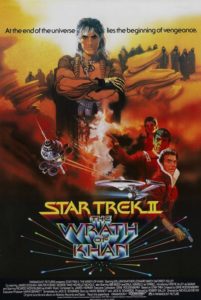 This is probably the second best Science Fiction movie ever made, and I could argue it is better than Empire Strikes Back depending on the day. You can tell from the first ten minutes that you are in for a wild ride and that the movie was shot by not only fans of the franchise, but artists who knew their craft. There isn’t a single wasted frame in the entire movie, and the adventure the movie takes you on is thrilling from beginning to end.
This is probably the second best Science Fiction movie ever made, and I could argue it is better than Empire Strikes Back depending on the day. You can tell from the first ten minutes that you are in for a wild ride and that the movie was shot by not only fans of the franchise, but artists who knew their craft. There isn’t a single wasted frame in the entire movie, and the adventure the movie takes you on is thrilling from beginning to end.
The film focuses on the titular villain from the TV show who Kirk abandoned on Ceti Alpha 5 and Khan’s quest to seek revenge on Kirk. This plot is skillfully interwoven with another plot concerning a terraforming device dubbed the Genesis project. As the Genesis project ramps up to create new life on a desolate planet, Khan attempts to take over the project himself and use it as a weapon against the Federation. Through subterfuge and mind control slugs, Khan almost succeeds after marooning Kirk on the planet where Genesis was developed, but Spock and the crew of the Enterprise rescue Kirk in time for him to save the day.
I cannot overstate how good this film is, from start to finish. Everything about this film oozes personality, and there are good reasons for it to be included in many top movie lists. Shatner doesn’t screw up his role, Khan is a perfect foil for Kirk and the entire cast is at their absolute best. Even the newly introduced characters like Carol Marcus and David, Kirk and Carol’s son, are used to enhance the storytelling, not hinder it. The set design is great, the soundtrack is harrowing, and you get some of the most memorable Star Trek moments from this movie, such as Shatner yelling Khan at the top of his lungs in anger, and the death of Spock.
Star Trek III: The Search for Spock
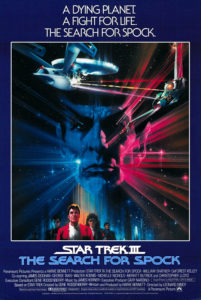 This film jettisons any momentum it should have had from The Wrath of Khan right away, and takes a sharp turn into the boring sector. This was the only film I couldn’t make it through in a single sitting after we stopped the movie about forty minutes in. Why did we stop forty minutes in you ask? Because we were laughing too hard at Kirk and Sarek while they were fighting over why Kirk shot Spock’s body into space.
This film jettisons any momentum it should have had from The Wrath of Khan right away, and takes a sharp turn into the boring sector. This was the only film I couldn’t make it through in a single sitting after we stopped the movie about forty minutes in. Why did we stop forty minutes in you ask? Because we were laughing too hard at Kirk and Sarek while they were fighting over why Kirk shot Spock’s body into space.
The only character bringing anything new to the table is McCoy, who Spock mind melded with before his death in Wrath of Khan. DeForest Kelley bounces between grief and facing the unknown quite well, and ultimately helps bring the characters of McCoy and Spock closer together in the end. After the crew of the Enterprise steals a ship, due to the Enterprise being decommissioned, they head to the Genesis planet to retrieve Spock’s body for a proper burial on Vulcan.
Of course, Klingons are investigating the Genesis planet as well, intent on unlocking its terraforming secrets in order to weaponize it against the Federation. Ultimately they just end up complicating the plot, as their motives are never fully realized beyond the brief description I just gave. They have no conviction and seem just to be following orders, making the Klingons as one dimensional as ever. Not even a Klingon Christopher Lloyd could save this movie.
The movie ends with the resurrection of Spock through an ancient Vulcan tradition, and reunites the crew with their old friend. It’s just a shame the journey to do so was so by the numbers it became boring.
Star Trek IV: The Voyage Home
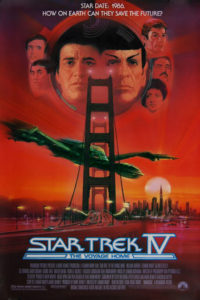 Oh what I would give to be a fly in the writer’s room for this masterpiece. The Voyage Home closes out the Genesis trilogy, starting with The Wrath of Khan, and does so in the most goofy of ways by time traveling the crew of the Enterprise to the 80’s to save the whales! I really wish I was making this up, but I also really wish everyone on the planet sees this amazing movie. Leonard Nimoy chews so much scenery! Kirk shits on everything 80’s! McCoy gives a lady magic future pills to cure her illness! This movie is so gloriously cheesy it turns the corner to amazing pretty much out of the gate.
Oh what I would give to be a fly in the writer’s room for this masterpiece. The Voyage Home closes out the Genesis trilogy, starting with The Wrath of Khan, and does so in the most goofy of ways by time traveling the crew of the Enterprise to the 80’s to save the whales! I really wish I was making this up, but I also really wish everyone on the planet sees this amazing movie. Leonard Nimoy chews so much scenery! Kirk shits on everything 80’s! McCoy gives a lady magic future pills to cure her illness! This movie is so gloriously cheesy it turns the corner to amazing pretty much out of the gate.
The song of the humpback whale, it turns out, was actually a communication being transmitted through space. Who knew? As Kirk and the crew are returning to Earth, in a stolen Klingon Warbird I might add, the humpback mothership descends on Earth ready to destroy all life because humpback whales are now extinct. Sure, why not. So they crew decide to take the only logical step: Time travel back to the 80’s, steal a pair of humpback whales to repopulate, and then return to the 23rd century.
I couldn’t make this plotline up with even the hardest of drugs. This movie actually got made and it is absolutely amazing.
After parking the Warbird in the middle of a park in San Francisco (cloaked of course), the crew dispatch on not one, not two, but three separate heists.
- Kirk and Spock go to steal the whales.
- Sulu, Scotty and McCoy go to steal materials to build tanks for the whales in the Klingon Bird of Prey, because for some reason that isn’t a standard feature in the Klingon Armada.
- Chekov and Uhura go to steal nuclear weapons to power the ship.
Eat your heart out Danny Ocean.
Fun moments in the 80’s with the Enterprise crew include Spock’s exposure to punk rock, the confusion about public transportation, the incredibly Russian Chekov asking the United States military for nukes during the Cold War, McCoy calling the medical technology of the time archaic and slipping a dying woman some medication from the future, and Kirk abducting a marine biologist to take back to the future.
All in all, The Voyage Home is good wholesome fun for the whole family. Check out the amazing The 1986cast for more Voyage Home goodness.
Star Trek V: The Final Frontier
 Here’s the synopsis for this movie: Captain Kirk and his crew must deal with Mr. Spock’s long-lost half-brother who hijacks the Enterprise for an obsessive search for the Supreme Being at the center of the galaxy. Believe it or not, the movie is more boring than that synopsis. But, we did get the amazing Kirk meme, Captain Kirk is Climbing the Mountain, out of the garbage fire that is this movie so I guess not all is lost. Also, Shatner thought he could direct, which is… a thing?
Here’s the synopsis for this movie: Captain Kirk and his crew must deal with Mr. Spock’s long-lost half-brother who hijacks the Enterprise for an obsessive search for the Supreme Being at the center of the galaxy. Believe it or not, the movie is more boring than that synopsis. But, we did get the amazing Kirk meme, Captain Kirk is Climbing the Mountain, out of the garbage fire that is this movie so I guess not all is lost. Also, Shatner thought he could direct, which is… a thing?
The film misses the mark completely in every regard. The special effects feel cheesy, the themes are incredibly shallow and it feels like everyone decided to do this movie because they were bored. I would say it is probably the worst of all of the Star Trek movies.
 Star Trek VI: The Undiscovered Country
Star Trek VI: The Undiscovered Country
Undiscovered Country was supposed to be the final movie for The Original Series crew, so they pull out all of the stops to make sure the movie delivers. It ties up a plot from the show by having the entire movie be about peace between the Klingons and the Federation, and by the end it achieves its goals. It rounds out everything incredibly well, and serves as a great farewell for a majority of the cast we have come to love over the years.
The best part about this movie is that by the end of it, it is the perfect setup for the start of The Next Generation, even though the movie came out in the middle of The Next Generation’s 7 season run. The movie not only serves as payoff by being the end of The Original Series, but by answering questions and filling in detailed events only hinted at in The Next Generation. This movie is the template for a connected universe, and bridges the gap incredibly well. Michael Dorn even appears as Worf’s great grandfather!
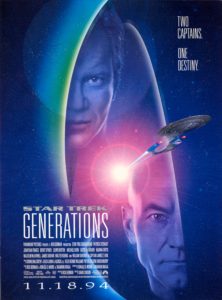 Star Trek: Generations
Star Trek: Generations
This movie is incredibly convoluted in both scope and execution. You do get to see Kirk and Picard work together, but at what cost? The premise is amazing, including a villain who has a long term plan that affects both crews. It is sad that this is the first film to feature The Next Generation cast, because they are way better than the script they were handed. They try to ram too much into this movie, and it suffers because of it. There are a lot of callbacks to The Next Generation, and unless you are incredibly well versed in certain aspects of the show, a lot of it can go over your head.
As soon as the planet ending ribbon starts making its way through the galaxy, the movie grinds to a complete halt. Kirk is introduced in to Picard in a spirit realm, and makes no contribution to the overall plot of the movie aside from being another body to fight Soran after everyone dies a horrible death and the ribbon transports Picard to… a weird purgatory Kirk has been stuck in for over 50 years I guess? Kirk shows up in the movie, but only interacts with Picard. Not every Original Series cast member appears in the movie, so it kind of falls flat on the promise of seeing the crews interact, and instead only focuses on the interactions of the Captains.
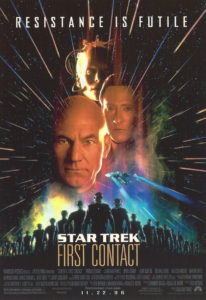 Star Trek: First Contact
Star Trek: First Contact
First Contact serves three purposes; it shows an important moment in Starfleet’s History, it is the first full movie for The Next Generation cast, and it brings closure to the Borg threat. It was great that Generations came before First Contact, because it allowed all of these watermark moments, like Data using his emotion chip, to happen before this movie.
First Contact is a time travel movie, where the Enterprise is flung back to the mid 21st while chasing a Borg ship that altered the timeline, making Earth a Borg Planet. Half of the crew lands on Earth to ensure humans do make contact with the vulcans, and the other half is left on the Enterprise to defend against a takeover by the Borg. This movie introduces a fearsome foe for Picard in the form of the Borg Queen, who is an absolute bad ass.
The splitting of the crew between survivors on a compromised Enterprise and the team on Earth directly breaking the Prime Directive, is great because it allows all of the characters to shine. And LaForge finally gets cybernetic eyes, which is great! And just like the Star Trek movies directed by first officer Spock, this movie is directed by none other than Will Riker himself: Jonathan Frakes.
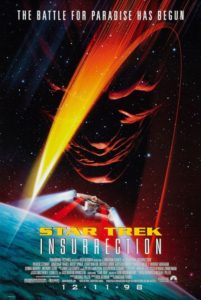 Star Trek: Insurrection
Star Trek: Insurrection
Picard ropes his crew into going against the wishes of Federation and it couldn’t be more glorious. This is the pinnacle of everything the crew of the Enterprise-D/E represents, and feels like a natural organic choice for them. None of them feel out of character and because of this, they all shine.
The plot focuses around a paradise planet inhabited by the Ba’ku where people don’t age, and an alien race with the backing of the Federation trying to monetize and control this strange side effect. Their plot involves abducting the entire population of the a city, and Jean-Luc Picard will not let this stand. The crew defects from the Federation to protect the population all while experiencing effects of the planet themselves. Worf gets a zit, LaForge regains natural sight, and in the only downside of the entire movie, Riker shaves off his magnificent beard at the request of Deanna Troi.
This movie feels like a long form Next Generation episode, but with a bigger budget and a more involved story. It is everything you could ever want.
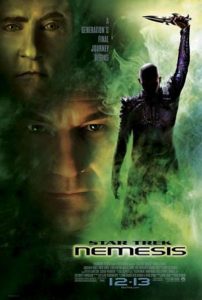 Star Trek: Nemesis
Star Trek: Nemesis
You can tell the entire cast, except for maybe Michael Dorn, cashed their paycheck pretty much immediately. The plot feels rushed and tries to capture the same magic that Undiscovered Country did by trying to bring peace between the Federation and the Romulans. This is of course thrown into complete chaos by a baby faced Tom Hardy as a clone of Jean-Luc Picard.
The movie opens with a celebration of the human wedding of Will Riker and Deanna Troi, and includes the only film appearance of Wil Wheaton as Wesley Crusher. As the human newlyweds, but not yet Betazed newlyweds, are being delivered to Betazed, a mysterious signal diverts the crew to a planet bordering the neutral zone where they find a prototype of Data named B-4 (Get it?!). The Enterprise is tasked to travel to Romulus, with a cameo by now-Admiral Janeway, to broker peace. Through an incredibly convoluted exposition dump, we find out all of this is orchestrated by Shinzon, a human clone who somehow is in charge of the Romulans? And he has a starship that has a giant radiation canon? With a second in command that mind rapes Deanna Troi for no reason?
I found myself just nodding my head ‘sure’ through most of this movie completely disinterested. They try to enact an emotional payoff by ‘killing’ Data at the end of the movie, but they put too many plot elements in place earlier for anyone who has a basic understanding of computers to really feel the loss of Data. That and there is promise of the entire cast being naked, and we never get to see Worf, and the rest of the crew, go the full monty for a Betazed wedding. I was really hoping we would have gotten a tasteful shot of everyone’s ass at least, but no, I was denied that simple pleasure.
 Star Trek (2009)
Star Trek (2009)
Lens flares aside, this first film in the reboot series isn’t half bad. It is a little more action oriented than previous films, but that isn’t a bad thing. It brought new life to the universe, and through science fiction shenanigans, it was able to pay tribute to the ground covered beforehand and bring back Leonard Nimoy.
The biggest criticism is the change to Kirk. Instead of being a young man with big dreams, he is now just a whiny brat trying to be a better version than his father. It works because it is a trope, and it is fun seeing him climb through the ranks until he becomes acting Captain, but it doesn’t feel as earned as the original incarnation.
The other members of the new cast, John Cho as Sulu, Karl Urban as McCoy, Zoë Saldana as Uhura, Simon Pegg as Scotty and Zachary Quinto as Spock, don’t see much in the way of sweeping changes to their character. Kirk is the only one who has this personality shift and it sucks that he became the focal point in such a strong ensemble production. But Zachary Quinto is a perfect Spock, so it helps offset this weird new Kirk we got.
 Star Trek: Into Darkness
Star Trek: Into Darkness
You know when you go to a bar and there is a cover band there, and they sound decent for two songs, but then they try to do a poorly rehearsed heavy metal version of Hit Me Baby One More Time on a 12 string 4 neck guitar and pyrotechnics played by a band who of course has to tell you they are all vegan and handmade their own instruments? That is this movie, but with Wrath of Khan.
Oh, and Khan is a white guy for some reason.
 Star Trek: Beyond
Star Trek: Beyond
This was not only one of my favorite Star Trek movies, but one of my favorite movies of 2016. I ended up seeing this movie three times in theaters, and loved every moment of it. The cast really seems to be leaning into their roles, and they aren’t beholden to any sort of previous installment. It feels complete because, Kirk aside, they are playing their characters as they were originally portrayed in The Original Series. And even then Kirk is settling into the shoes of the original Kirk we know and love.
The main departure the movie makes is it essentially one giant away mission. The crew feels small and powerless, making their triumph and success at the end of the movie earned rather than gifted. Even though the movie splits the cast up at the end of the first act, they are all given enough to do throughout the film that you don’t feel bored. The new enemy Krall, played by Idris Elba, is even given enough backstory that you understand his resistance to the Federation. Like Khan was a good analogue of the original Kirk, Krall is a good reflection of this era’s Kirk.
Beyond borrows some of the best concepts from Nemesis, like an inescapable biological weapon, but other than that it very rarely calls back to other plot points. It throws some nice memories of the Original Series in for the 50th Anniversary, and it brings fun new members to the large ensemble cast. It even opens with Chris Pine delivering a Captain’s Log entry, a first in the rebooted series. These tiny moments, and a damn fine screenplay, make the latest entry one of the best of the series.
As far as the quality of films go, The Wrath of Khan, Undiscovered Country, First Contact, Insurrection, Star Trek (2009), and Beyond are my favorites; and while it was very much a product of it’s time, Voyage Home is a good time too. I cannot wait for the supposed fourth movie in the reboot timeline, and eagerly anticipate whatever Discovery ends up being.
The immediate draw for me are the characters of the USS Enterprise, be it the original cast or the cast of The Next Generation. Kirk is brash and risky. Spock is reasoned and sensible. Bones is pig headed and stern. Uhura is knowledgeable and fearless. Sulu is confident and caring. Chekov is loyal and excited. Scotty is ingenious and resourceful. Picard is calculating and accepting. Riker is strong and loyal. Data is curious and exact. LaForge is calculated and bold. Dr. Crusher is stern and accepting. Worf is noble and self aware. Guinan is protective and nurturing. Deanna Troi is the worst counselor ever and I still have no idea why she is on the ship. All of these values and traits are something I get in spurts that inspire me to be better, and I see parts of myself in all of the crew.
Like all good science fiction, Star Trek is reflective of the time in which it was made. While the Prime Directive is in place throughout all of the individual series, Kirk and his crew seem to ignore that rule and this leads to a great deal of conflict in their travels. In The Trouble with Tribbles a bar fight breaks out between Klingons and ends with Kirk transporting the rapidly reproducing Tribbles aboard the Klingon ship. Sure it is done with a wink and a smile, and it is really funny, but it is still a dick move.
Throughout the films, Kirk is constantly butting heads with the Klingons, and it is even a major plot point though the Original Series movies. Kirk hates Klingons with a burning passion. This rejection of outsiders was very prominent in American culture throughout the late 60’s due to the Cold War, and the original Kirk embodied that. But the rebooted Kirk, played Chris Pine, seems to fit into more the post 9/11 American ideal of shoot first, ask questions later. Pine-Kirk is defined by his grief and lack of a father figure, playing into the wayward feelings and concerns current 18-35 year olds define themselves. Beyond opens with a monologue of dreaded monotony and sameness, reflecting the need to constantly change. Shatner-Kirk is a perfect reflection of the Cold War in the 60’s, while Pine-Kirk is a perfect reflection of the 2010’s uncertainty.
Meanwhile, Captain Jean-Luc Picard and his crew of the Enterprise is more diverse, accepting, and striving to learn about others. While the Original Series cast faced a lot of external problems, the best moments in The Next Generation come from characters pushing themselves beyond what they thought was possible, and looking at problems from different viewpoints. A lot of the problems that face this new crew of the Enterprise are solved by science and self development instead of fighting a Gorn and sleeping with an Orion Slave Girl.
The Next Generation also placed strong emphasis on family. Using Worf and Alexander, the show touches on the difficulties of raising a child within a culture opposite of your own while taking pride and showing your children your own heritage. Data and Lore are used to explore the themes of blind acceptance of family, simply because you were a byproduct of the same person’s hard work. Lwaxana Troi blows through the Enterprise like a sexual hurricane, allowing the show to tackle themes of being embarrassed by your parents and how a child can strive to separate themselves from that legacy.
But neither the narrative of The Original Series or The Next Generation is wrong, and one is not better than the other. Of course, The Next Generation couldn’t happen without The Original Series, but beyond some cameos and the headache that is Star Trek: Generations, the two exist in a separate but equal world. They co-exist and inform each other, and help us see our own world from a variety of perspectives. Star Trek is far from perfect, but at the same time its flaws are what make the shows and films timeless.


